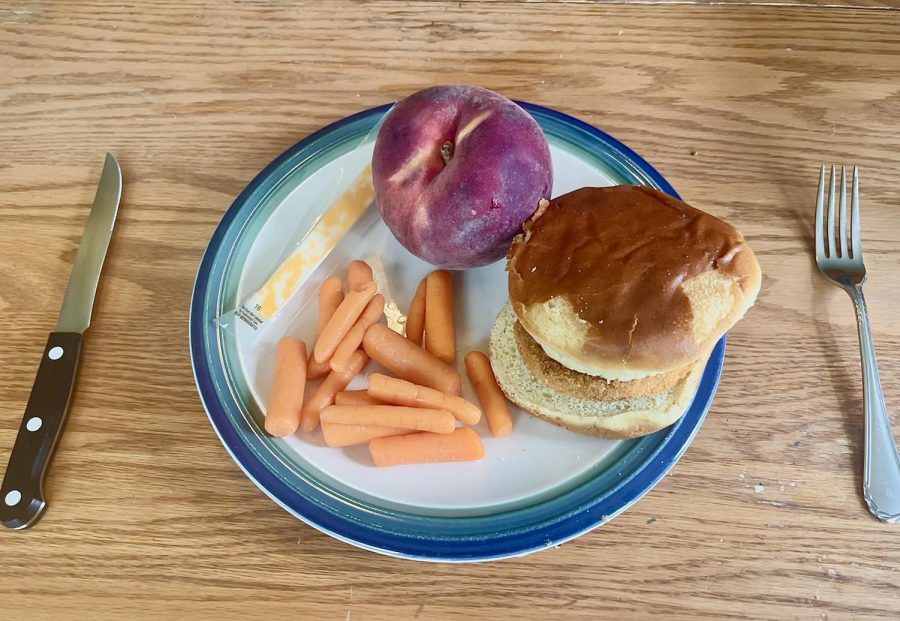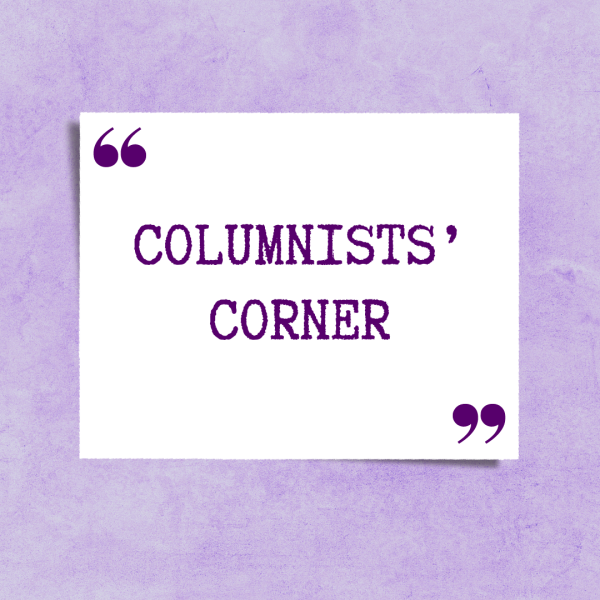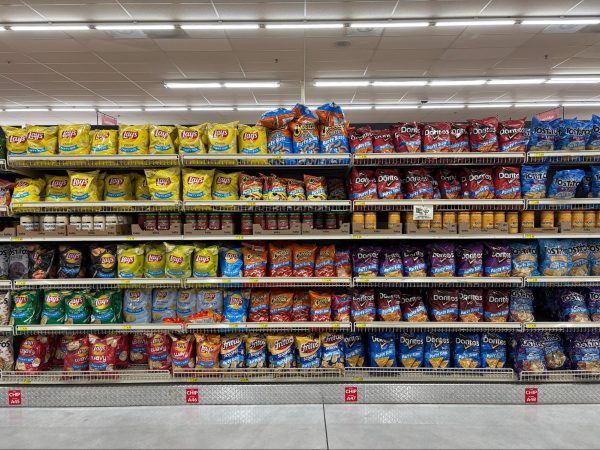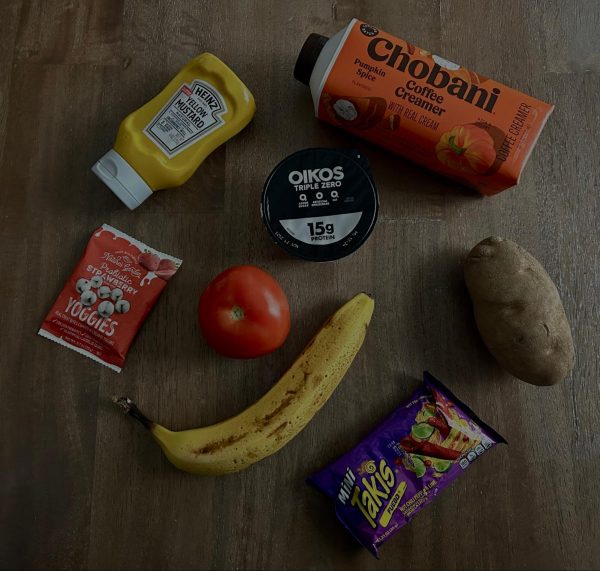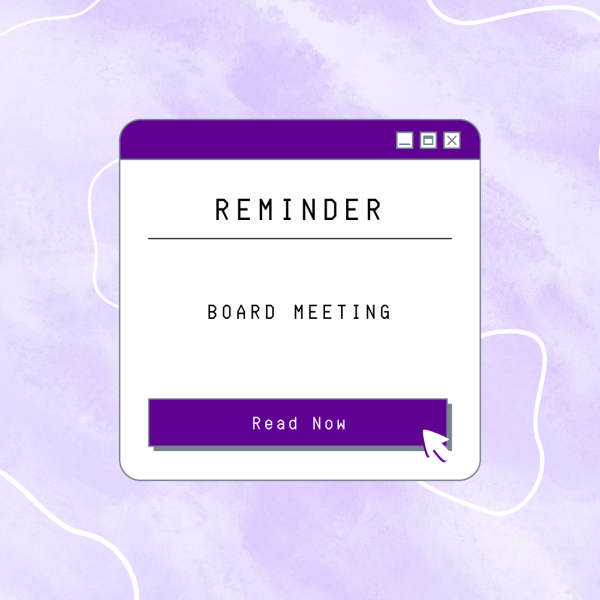Having a good relationship with food
Photo By Lizzy Sidman
A plate sits on a kitchen table with a generally balanced meal: a chicken sandwich, baby carrots, a cheese stick and a peach. A healthy meal can look different for everyone but broadly, a meal should consist of fruits, vegetables, grains, protein and dairy.
I lay in my room crying and in the fetal position; I had consumed more than 700 calories that day. I had exercised extensively that morning so, along with my daily half-bagel, I wanted to treat myself to a donut and a large hot chocolate. My daily goal was to finish the day with around 500 calories below my somewhat healthy goal of 1,200; including exercise, I would burn some additional calories. I decided to simply not eat anything for the rest of the day even though it was only around noon. I lay there for hours, a gaping hole in my stomach slowly growing and growing until I began to sob. I held my gut in anguish, hoping and praying that someone would notice; hoping someone would care. Even in those disgusting moments, I felt pride in my empty stomach and satisfaction in my pain because I needed to obtain that unrealistic standard I had set in my mind.
It took me years of mental fortitude and support from my therapist to repair my relationship with food. To be honest, I’m not sure I could replicate my recovery if I were to be in the same situation. What I do know is that even if you do not exhibit any disordered eating habits, it is incredibly important to build a healthy and thoughtful alliance with your food.
My history with disordered eating started at the beginning of middle school, but like many other girls, I had always thought about my weight and how I looked.
The nonprofit organization National Institute on Media and the Family (NIMF) reported on young girls’ views on their bodies in their study on the media’s effect on body image.
“At age thirteen, 53% of American girls are ‘unhappy with their bodies.’ This grows to 78% by the time girls reach seventeen,” according to the study by NIMF.
No child should ever be concerned with how their bodies look under any circumstance, but this is not the case. Distressingly, over half of the girls at the age of 13 do not like their bodies. This startling statistic points to a societal issue causing young women to think this way; some studies say the media is to blame.
“58% of female characters in [a large selection of] movies had comments made about their looks, as did 28% in television shows and 26% of the female models in the accompanying commercials,” another study by the National Institute on Media and the Family said.
Generation Z was the first generation to grow up in a wholly digital society. At times, this reality was helpful for information consumption and learning, but more detrimental was the negative effects of media on children. The digital age is filled with ads and apps where companies will do anything to get you to buy a product. For example, diet apps show images implying a superior body type and capitalize on people’s insecurities, and too often those people are children.
As insecurities fester in adolescents’ minds, some may develop what is known as disordered eating. Disordered eating can mean many different things, but mainly it is a tainted relationship with food that makes one change their eating habits in an unhealthy manner. Many people who exhibit these disordered behaviors almost exclusively think of food, which causes large problems.
“If specific foods become your only options, your mindset might be one of obsession,” Certified Eating Disorders Registered Dietician (CEDRD) Sondra Kronberg wrote for the National Eating Disorder Association (NEDA).
Whether it be eating too much or too little or cutting out entire food groups, disordered eating is an infatuation, or even obsession, with food that needs to be broken to heal. To do this, one step could be to quit diets that encourage the cutting of food groups like carbohydrates or sugars.
Instead of dieting, many eating disorder specialists like Kronberg advocate for what is known as “relaxed eating”.
“[Relaxed eating] is the ability to listen and satisfy your hunger allowing for pleasurable and whimsical eating with flexibility and the absence of remorse. It allows you to eat when you are hungry and stop when you are satisfied. It affords you the choice of eating more or less or differently than usual without judgment, punishment or the need to compensate,” Kronberg wrote.
Relaxed eating is a way to repair a damaged relationship with food, whether you are eating excessively or incompetently. Almost always, one’s body tells them what they need and want, so there should be no guilt when it comes to fluctuation in what one consumes day-to-day.
That is where things like calorie counting apps that expect an individual to consume the same amount of calories and nutrients every day can be extremely harmful. Research shows that these apps do not help the majority of their users lose weight.
“This idea of ‘a calorie in and a calorie out’ when it comes to weight loss is not only antiquated, it’s just wrong,” obesity specialist at Harvard Medical School Dr. Fatima Cody Stanford said to Harvard Health Publishing in an article about calorie counting.
While calorie counting apps may work for weight loss in some adults, these careful and obsessive calorie calculations often do not lead to uniform weight loss, rather at times leading to disordered eating.
In 2017, Duke University Health System (DUHS) launched a study where they created a comprehensive health app with features like water intake, calorie counting, exercise logging and weight.
“Of the participants, 74.3% reported using this app as a form of calorie counting. Of those individuals, 73.1% identified the app as a contributor to their eating disorder symptoms,” researcher Cheri Levinson concluded in a study for DUHS.
DUHS found that a large number of participants who decided to download the app were people with diagnosed eating disorders. These apps can be helpful to some adults looking for a healthy lifestyle, but too often calorie counters are abused to play into eating disorders.
When I was in the seventh grade, I downloaded a calorie-counting app, MyFitnessPal, lying that I was 18 years old. At first, I didn’t use the app too often, but I subconsciously made sure it was in a place on my phone that was easily accessible. At the beginning of the pandemic and the end of the eighth grade, I began to use the app religiously. I weighed myself twice a day, exercised excessively and attempted to finish every day with around 500 calories left to eat before the 1,200-calorie goal. The app made it competitive. I wanted to win my challenge every day, and I will say that MyFitnessPal is one of the sole reasons my disordered eating went on for as long as it did. It was only two years later when I deleted that app for good that the gaping hole inside of me began to mend. Now I make sure to never count my calories, to eat when I am hungry and to stop when I am full.
“Eating should be a balanced activity that is neither the best nor the worst part of a day. You should enjoy the foods you consume but not worship them,” Kronberg wrote.
To have a good relationship with food is to experience indifference. There will always be days when it is mentally difficult to eat three meals a day, just as there will be days when you will want to eat everything in sight. While challenging, all it takes to build that relationship with food is to relax and realize the value food has for your body.
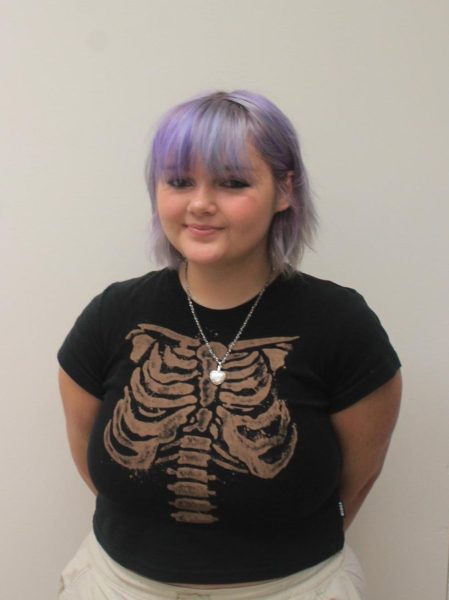
Name: Lizzy Sidman
Position: Production and Ads & Business Executive
Graduation year: 2024
A few sentences about...


